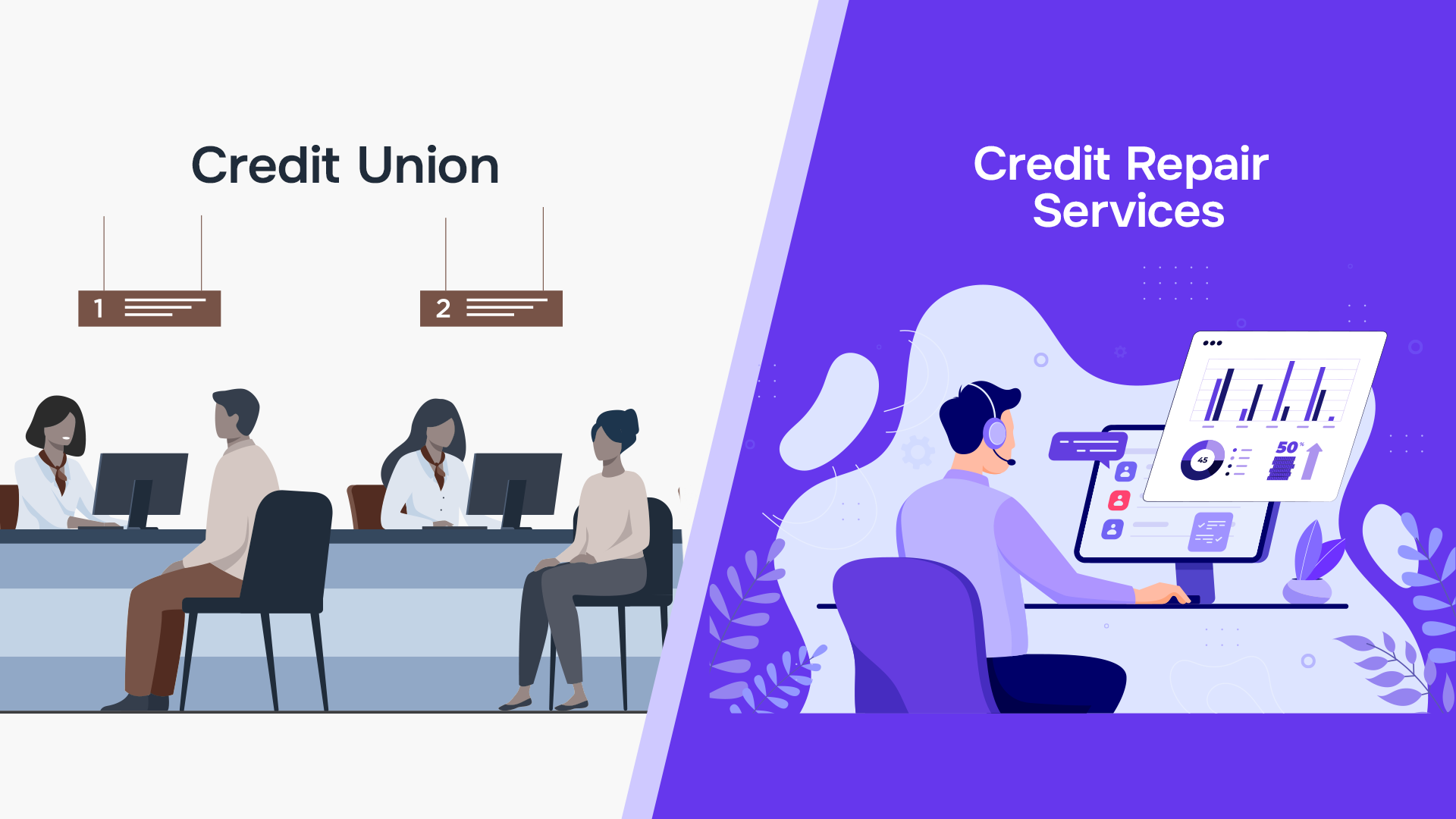Credit Union vs. Credit Repair Services: Which One Do You Need?
Both credit union and credit repair services serve distinct purposes to your credit. Discover which one suits your needs best.

Managing your finances can be such a daunting task, especially when you’re faced with credit challenges. Therefore, choosing the right support system to help you build or repair your credit can make all the difference.
Usually, two prominent options that often arise in such discussions are credit unions and credit repair services. Both serve distinct purposes but can be invaluable depending on your needs. In this article, you‘ll discover the differences, their benefits, and how to determine which one is right for you.
Understanding Credit Unions
A credit union is a member-owned financial cooperative that provides various banking services, including savings accounts, loans, and credit-building programs. Unlike traditional banks, credit unions are nonprofit organizations which prioritize the financial well-being of their members rather than shareholder profits.
Key Features of Credit Unions:
- Lower Fees and Interest Rates
Credit unions typically offer lower fees and more favourable interest rates on loans and credit cards compared to traditional banks. This can result in significant savings over time, especially for members who rely on these institutions for major financial commitments like mortgages or auto loans. Additionally, credit unions often have fewer service charges and no minimum balance requirements for their accounts, making them a budget-friendly choice for everyday banking.
- Personalized Services
Members often benefit from tailored advice and support, especially regarding financial literacy and credit building. Credit union staff are usually more accessible and take the time to understand individual financial goals. Whether you need help creating a savings plan, refinancing a loan, or improving your credit score, credit unions are equipped to provide one-on-one guidance that meets your specific needs.
- Credit-Building Tools
Many credit unions offer secured credit cards, credit-builder loans, and financial education programs to help members improve their credit scores. These tools are designed with flexibility and member success in mind, ensuring that individuals with poor or limited credit history have opportunities to rebuild and enhance their creditworthiness. For example, credit-builder loans often come with lower interest rates and longer repayment terms to ease the burden on borrowers.
How Credit Unions Can Help Your Credit:
If you’re looking to establish or rebuild your credit, credit unions can provide reliable tools and guidance. For instance, owning a secured credit card from a credit union allows you to build credit responsibly by making small purchases and paying off your balance on time.
Additionally, credit-builder loans enable you to demonstrate positive repayment behavior, which directly impacts your credit score. These loans are often small and secured by a savings account, making them a safe and accessible way to prove your ability to repay debt. Over time, consistently meeting payment deadlines can significantly boost your credit profile, opening doors to better financial opportunities.
Beyond specific products, credit unions also report your repayment activity to credit bureaus just like traditional lenders. This means that every responsible financial decision you make with your credit union accounts directly contributes to improving your credit score. Coupled with ongoing financial education workshops and budgeting resources often offered by credit unions, members are equipped with the knowledge and tools to build lasting financial stability.
What Are Credit Repair Services?
Credit repair services focus on identifying and disputing inaccuracies on your credit report to help improve your credit score. These services are provided by companies or individuals who understand the nuances of credit laws and reporting.
Key Features of Credit Repair Services:
- Disputing Errors
Credit repair specialists review your credit reports for errors, such as incorrect account information or fraudulent activity, and dispute them with the credit bureaus. They are well-versed in identifying common inaccuracies, such as outdated account statuses or mistaken balances, that can affect your credit score. By challenging these discrepancies on your behalf, credit repair services aim to have them corrected or removed, potentially leading to an improved credit profile. The process often involves filing formal disputes with major credit bureaus—Equifax, Experian, and TransUnion—and following up to ensure the errors are addressed.
- Negotiation Expertise
Some credit repair services negotiate with creditors to remove negative items like late payments or settle debts for less than the owed amount. This feature is especially valuable for individuals struggling with overdue accounts or collections. Credit repair specialists can reach out to creditors on your behalf and attempt to reach a settlement or payment agreement that lowers your outstanding balance. In certain cases, they may even succeed in having derogatory marks, like late payments, removed from your credit report after negotiations. However, it's important to remember that not all creditors will agree to these terms, and success is not guaranteed.
- Personalized Credit Strategies
Credit repair services offer tailored plans for improving your credit based on your unique financial situation. They assess your current credit status and create a strategy to address your specific challenges. Whether you have high credit card debt, a history of missed payments, or accounts in collections, these professionals design a customized approach to help you move forward. This personalized support often includes detailed steps, such as setting up a debt repayment plan, improving your credit utilization rate, or providing resources on managing credit responsibly. Their goal is to put you on a path toward better credit health while addressing your individual financial needs.
What Credit Repair Services Can’t Do:
Unlike popular opinions, it’s very important to note that credit repair services cannot erase legitimate debts or remove accurate negative information from your credit report. Credit repair companies are often misunderstood because some people expect them to “erase” debts or negative marks that are valid. The truth is, if a negative item is accurate and reflects a legitimate financial issue—such as a late payment, bankruptcy, or tax lien—it cannot be removed simply by hiring a credit repair service. The service may assist in negotiating with creditors, but they cannot change or remove factual information from your report.
If a company promises to “erase” accurate information or guarantees a specific increase in your credit score, it’s a red flag. Legitimate credit repair companies focus on correcting errors, improving your credit management habits, and negotiating with creditors, not fabricating or altering the truth about your financial history. Consumers should always be cautious of any service that guarantees unrealistic outcomes, as such promises could be indicative of potential scams or unethical practices.
Comparing Credit Unions and Credit Repair Services
While both credit unions and credit repair services can assist in improving your financial health, they cater to different needs. Let’s break down their main distinctions.
Purpose
Credit Unions aim to provide financial tools and services to help members achieve overall financial stability and growth whereas Credit Repair Services focus solely on addressing credit report issues to improve your credit score.
Cost
Credit Unions usually require membership fees, which are often nominal. Services like secured credit cards or loans come with minimal costs compared to traditional banks. On the other hand, Credit Repair Services typically charge monthly fees or flat rates for their services, which can add up over time.
Approach
Credit Unions provide long-term solutions, financial education, and credit-building opportunities while Credit Repair Services offer short-term fixes by addressing inaccuracies or negotiating with creditors.
How to Choose Between the Two
Deciding between a credit union and credit repair services depends on your financial goals and the state of your credit. Here are some scenarios to help guide your decision:
When to Choose a Credit Union:
- You want to build or rebuild credit over time using tools like secured credit cards or credit-builder loans.
- You’re looking for a supportive financial partner that prioritizes your financial growth.
- You prefer lower fees and personalized services.
When to Choose Credit Repair Services:
- You suspect errors or inaccuracies on your credit report that need professional dispute assistance.
- You’ve been denied loans or credit cards due to a low credit score caused by incorrect information.
- You need help understanding complex credit issues or negotiating with creditors.
Combining Credit Unions and Credit Repair Services
In some cases, using both options simultaneously can be beneficial. For instance, while credit repair services handle disputes and remove inaccuracies, a credit union can provide tools to help you build positive credit habits. This combination ensures that you’re not just addressing immediate concerns but also setting the foundation for long-term financial health.
For example, once negative items are resolved, you can use a secured credit card from your credit union to make small, manageable purchases and pay them off each month. Over time, this will contribute positively to your payment history—a major factor in credit scoring.
The Bottom Line
When deciding between a credit union and credit repair services, it’s essential to assess your unique financial needs. Credit unions offer a holistic approach to financial health, with tools and resources to help you build credit over time. On the other hand, credit repair services address immediate credit report issues that might be hindering your progress.
In many cases, the best solution lies in leveraging the strengths of both options. By combining the support of a credit union with the expertise of a reputable credit repair service, you can take control of your financial future and work toward a stronger credit profile.
No matter your choice, consistency and responsible financial habits remain the cornerstone of lasting credit improvement. Choose wisely and take the first step toward financial empowerment today.
Ready to take charge of your credit? Start by signing up for Credit Veto today and gain access to expert credit repair services, tools, and resources designed to help you achieve your financial goals. Don't wait—subscribe now and begin building a stronger, more secure financial future!




Comments ()